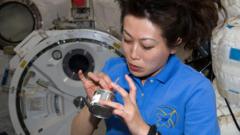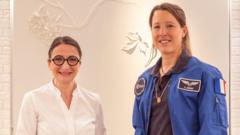A groundbreaking experiment launched by the European Space Agency (ESA) seeks to explore the potential of cultivating lab-grown food in space, with the aim of transforming astronaut diets and reducing the astronomical costs associated with food transportation. The experiment, which today entered orbit, marks a significant step towards establishing a sustainable food source for long-term space exploration.
This ESA initiative comes amid efforts to make human presence across various celestial bodies more feasible. Currently, feeding an astronaut aboard the International Space Station (ISS) can cost up to £20,000 per day. Dr. Aqeel Shamsul, CEO of Bedford-based Frontier Space, emphasizes that lab-grown food will be integral to supporting NASA's ambition of establishing human life on Mars and beyond.
The concept revolves around growing essential food components—proteins, fats, and carbohydrates—in controlled environments such as bioreactors. This process is parallel to forms of fermentation already familiar on Earth but enhanced through precision biotechnology. The aim is to ultimately create a functioning food production unit aboard the ISS in the next two years, fostering an ecosystem where astronauts can reliably produce their own meals.
The current experiment involves flying a small bioreactor in a cube satellite aboard the Phoenix spacecraft, which will orbit the Earth for approximately three hours before returning to a controlled landing off the coast of Portugal. Data collected will help refine future bioreactors destined for space.
While traditional freeze-dried astronaut food has been the standard, lab-grown offerings promise to provide nutritional advantages. Dr. Helen Sharman, the first British astronaut, shared insights on the potential improvements lab-grown food could bring to astronauts’ diets, crucial for addressing the physiological challenges they face during extended missions.
The culinary aspect of this innovative project is also given considerable thought, with Jakub Radzikowski, Imperial College’s culinary designer, experimenting with natural ingredients while awaiting regulatory green lights for lab-grown elements. His goal is to create comforting, familiar dishes from diverse cuisines to enhance astronauts' eating experiences in space.
As these advancements unfold, the hope is that future astronauts might find themselves enjoying gourmet meals—crafted from scratch—amid the stars, ensuring both their physical and emotional well-being during their voyages into the unknown.

















